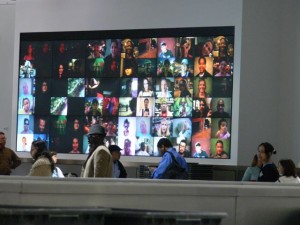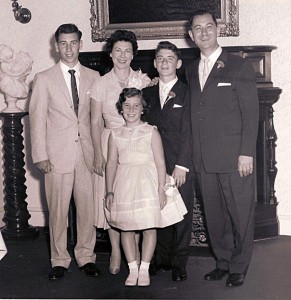
It's hard not to worry when everyone's watching
I jumped right in. If I couldn’t immediately let these 7th grade girls know a) I get middle school friendship issues, b) they could trust me to listen with compassion and respect, and c) this was a safe place to talk about stuff that really mattered, it was going to be a long and pointless hour.
My PowerPoint began with this email:
Hey Terra,
When me and my friend are alone we have a lot of fun. But when she’s with her other friends, she doesn’t talk to me at all. What do I do?
–Invisible Friend
“Who can relate to this situation?” I asked, raising my own hand high.
The girls shot each other furtive glances, but otherwise, didn’t move.
I advanced to the next slide.
Hey Terra,
My friends don’t want to be my friend anymore. They pick on me. They whisper and then look at me and laugh. When I try to make new friends they seem to steal them away from me by telling lies. My mom wants to talk to the other parents but I don’t want her to because it will make it worse! How do I deal with them?
–Lonely and Confused
“Does this one ring any bells for you? It sure does for me.” I said. My hand felt lonely and confused up there.
Again I advanced:
Hey Terra,
When I’m with these 5 girls at school I don’t behave. And even though I don’t want to, I feel like I have to act cool. I don’t wanna be with them but I have no other choice because if I leave them to be with nicer girls they’ll just call me names like “You’re a user.” And if I do leave I don’t know how to tell them. I’m really very confused.
–Lost
“How about this one, girls? C’mon. Be honest. Who’s been there?”
For the third time the girls scoped each other out, their nonverbal communication crackled with emotion, yet when my hand went up only one girl joined me. Before I could acknowledge her courage, she retreated. Probably hoping against hope that she hadn’t just ruined her entire life.
“You guys ever hear of Peer Approval Addiction?” I asked. “Nope? Well, let me explain it. You know the word addiction, right? As in drug addiction.”
They all nodded. A key element of the Good Girl Code is to impress adults with your maturity and intelligence whenever possible.
“An addiction is an out-of-control behavior that a person continues engaging in despite negative consequences to their mental or physical health, or their relationships. Why would someone do that? Not because they want to, but because they feel like they have no other choice. Just like the girl in the last email.
“Peer Approval Addiction is doing whatever it takes to fit in and be accepted by your friends and even by people you’re not close to but who you believe have power over you. That’s what’s going on right here, girls. That’s why you’re not raising your hands.
“I just want to let you know that you’re not fooling anyone. I know there have been times when you’ve felt just like ‘Invisible Friend’ and like ‘Lost and Confused.’ We all have. At least once in your life, you’ve also probably felt like you wanted to get out of a friendship because you weren’t comfortable with the way your friend was acting. At least once or maybe twice, you’ve been hurt when a friend turned against you and you didn’t have a clue why or what to do about it.
“Look, I know it can be a scary to publicly admit that you’ve been dissed, ditched or dumped by a so-called friend. I know that you’re thinking ‘If I raise my hand here and no one else does, someone’s going to tease me.’
“You’re not the only one who feels this way. All of us, teens and adults, at least once in our lives, have held ourselves back from telling the truth or doing what we knew was right because we were worried what other’s would think. So all of us are a little peer approval addicted. I know I sure am. How about you?”
I raised my hand and so did every single one of them.
We were making progress and we still had a full 54 minutes to go.












